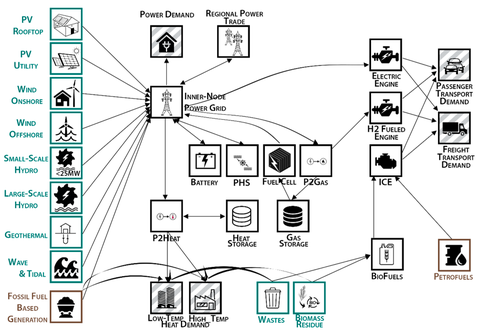Oct 13, 2023
A guest at InfraTrain 2023

Energy system model "GENeSYS-MOD" (Image source: http://www.osemosys.org/genesys-mod.html)
The InfraTrain 2023 workshop was held at the Technical University of Berlin from October 9 to 13, 2023. Doctoral student Jakob Baumgarten(TP E1: Market model-based energy economic analysis of H2 import demand and import potential of synthetic gases from MENA countries) also traveled from Dresden.
InfraTrain is a series of events on infrastructure research aimed at university graduates, doctoral students, scientists, junior staff from government institutions and representatives from industry who want to find out about the latest research methods. Each InfraTrain(ing) has a training session that covers a specific topic. Lectures on a specific topic, exercises, computer simulations and discussions on theoretical and policy issues are given by experienced lecturers and practitioners. The training is accompanied by seminars and guest lectures in which participants present and discuss current work in smaller groups.
On the first day, the workshop program, the programming language "Julia" and the in-house energy system model "GENeSYS-MOD" of the TU Berlin were presented. In the afternoon, a direct link was established with Prof. Mark Z. Jacobson from Stanford University in California, USA. In his presentation entitled "No Miracles Needed: Transitioning the World to 100% Clean, Renewable Energy and Storage for Everything", he emphasized the efficient use of hydrogen in the individual sectors and derived corresponding recommendations for action.
The objectives and step-by-step structure of the InfraTrain workshop were explained and moderated by Prof. Christian von Hirschhausen, Dr. Karlo Hainsch and Dr. Konstantin Löffler (all TU Berlin) on the second day of the event. Afterwards, different methodological approaches for developing a system model were discussed in group sessions. To this end, both existing scenarios and new scenarios were developed and compared with each other. For the implementation of the "GENeSYS-MOD" energy system model (see figure above), databases and studies were examined for target-oriented parameters.
On 11.10.2023, Prof. Franziska Holz (DIW Berlin & NTNU Trondheim) gave a lecture on scientific approaches for modeling energy systems. Four scenarios (Business-as-usual, Climate Tech, Survival of the fittest, Green Cooperation) were presented, the assumptions made therein were discussed intensively and partly taken into account for the own scenarios.
On the last two days of the workshop, the group work was intensified. The insights gained were then shared and interpreted in short presentations. The methodical and step-by-step procedures of the InfraTrain workshop opened up new scientific approaches for further development in sub-project E1.
